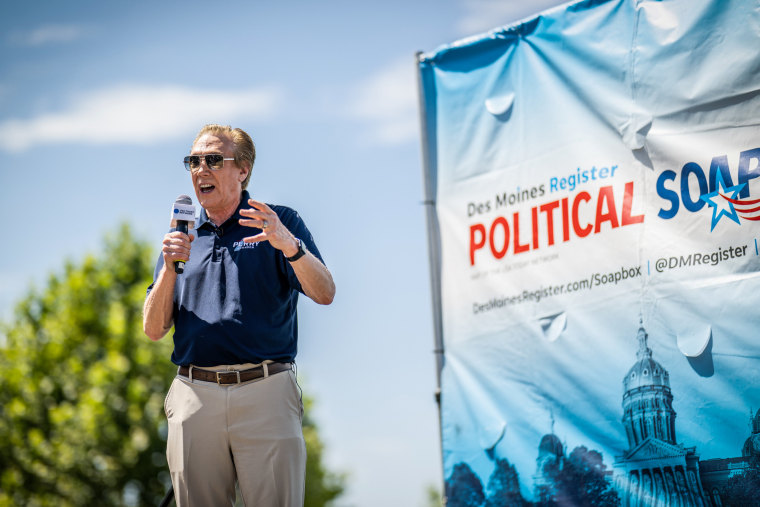When the Republican National Committee on Monday released a list of candidates who officially qualified for this week's GOP debate, a handful of those left out cried foul.
The RNC required candidates to meet a multi-pronged set of qualifications in order to appear on stage:
- Sign a pledge to back the eventual nominee and not participate in any unsanctioned debate.
- Raise money from 40,000 unique donors, including 200 people in at least 20 states and/or territories.
- Meet one of two polling criteria options: either receive 1% in three national polls, or hit 1% in two national polls and two polls from separate early nominating states — Iowa, New Hampshire, Nevada and South Carolina. (Those polls had to survey at least 800 likely voters and come from pollsters without affiliations with the candidates, along with a few other methodological requirements.)
That polling threshold proved evasive for some candidates who said they met the fundraising requirement: former Rep. Will Hurd, of Texas, Miami Mayor Francis Suarez, conservative commentator Larry Elder, Michigan businessman Perry Johnson and Ryan Binkley, a businessman and pastor.
Some of the candidates pointed to polls that showed them obtaining the needed level of support — but the RNC ultimately didn't accept those polls as meeting their requirements to be considered.
"The RNC worked over two years to deliver a transparent and fair primary process that will put our eventual nominee in the best position to beat Biden," RNC spokesman Keith Schipper told NBC News in a statement when asked to respond to the criticism from candidates about the criteria.
"Criteria to qualify for the first debate was clearly presented to campaigns and RNC leadership and members of the debate committee were in constant communication with candidates and campaigns throughout the qualifying period.”
Here's a look at the candidates who didn't make the stage, and why:
Perry Johnson
Johnson appeared to have qualified last week after he hit 1% in a flurry of last-minute polls.
But a source familiar with the RNC's criteria noted that one of those polls, from Victory Insights, polled 38 states as part of what it referred to as a "national sample." That means the sample did not include states where a significant portion of Republican primary and caucusgoers vote. Therefore, the poll did not meet the requirement of having a "national sample" in the eyes of the party.
In a statement, the Johnson campaign confirmed the RNC said it wouldn't count the Victory Insights poll.
And Johnson went on to accuse the party of going "over and above to disqualify Mr. Johnson based on flawed and biased polling assessments," threatening legal action. (The RNC did not immediately respond to a request for a response to that criticism.)
The Johnson campaign also argued he had qualified by pointing to other polls that didn't appear to meet the party's polling standards (including one that was conducted by former President Donald Trump's pollster and another that did not have the required sample size).
Francis Suarez
While Suarez's campaign put out a statement last week declaring he had hit the polling threshold for the debate, most news outlets disagreed (the NBC News Political Unit analysis had him one poll short going into the weekend).
But on Monday, Suarez eclipsed 1% in a national poll from McShane LLC/American Wire News, which would have qualified him if the poll had met the RNC standards.
The source familiar with the RNC criteria told NBC News the party took issue with how the survey screened for likely Republican voters, nixing it from qualification.
His campaign has not commented since the Monday night announcement he did not qualify.
Will Hurd
Hurd was always a longshot to make the first debate because he publicly refused to sign the party's pledge to support the eventual GOP nominee.
But his campaign was still highlighting his progress on meeting the other two pieces of the party's criteria.
When Hurd fell short on the polling threshold, his campaign took issue with the RNC's decision to count only polls from "likely" Republican primary/caucus voters, something directly spelled out in the party's initial qualifications.
Larry Elder
Elder claimed Monday night that he had hit the mark on the polls, but specifically pointed to one poll (Insider Advantage) that had too small a sample size to meet the party's criteria. He has also threatened to sue the RNC over its criteria.
Ryan Binkley
Binkley's case was clearest — he fell short of the party's polling requirement, hitting 1% in just a single public poll that appears to meet the party's criteria. However, Binkley has voiced frustration that his name isn't listed on many polls of the GOP field.

